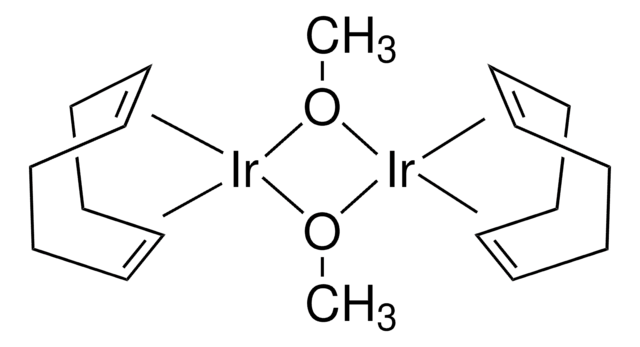79989
Tetrabutylammonium cyanide
technical, ≥80%
Synonyme(s) :
N,N,N-tributyl-1-butanaminium cyanide
About This Item
Produits recommandés
Qualité
technical
Niveau de qualité
Pureté
≥80%
Forme
crystals
Pf
89-92 °C (lit.)
Chaîne SMILES
[C-]#N.CCCC[N+](CCCC)(CCCC)CCCC
InChI
1S/C16H36N.CN/c1-5-9-13-17(14-10-6-2,15-11-7-3)16-12-8-4;1-2/h5-16H2,1-4H3;/q+1;-1
Clé InChI
KRRBFUJMQBDDPR-UHFFFAOYSA-N
Vous recherchez des produits similaires ? Visite Guide de comparaison des produits
Application
- For the deprotection of aliphatic thioacetate to synthesize free thiols in the presence of a protic solvent.
- In the O-TMS cyanosilylation of carbonyl compounds to synthesize cyanohydrin trimethylsilyl ethers in the presence of trimethylsilyl cyanide (TMSCN).
- For the ring expansion of β-lactams to synthesize γ-lactams through a bond cleavage of the β-lactam in the presence of acetonitrile.
Mention d'avertissement
Danger
Mentions de danger
Conseils de prudence
Classification des risques
Acute Tox. 1 Dermal - Acute Tox. 2 Inhalation - Acute Tox. 2 Oral - Aquatic Acute 1 - Aquatic Chronic 1
Risques supp
Code de la classe de stockage
6.1A - Combustible acute toxic Cat. 1 and 2 / very toxic hazardous materials
Classe de danger pour l'eau (WGK)
WGK 3
Point d'éclair (°F)
Not applicable
Point d'éclair (°C)
Not applicable
Équipement de protection individuelle
Eyeshields, Faceshields, Gloves, type P3 (EN 143) respirator cartridges
Certificats d'analyse (COA)
Recherchez un Certificats d'analyse (COA) en saisissant le numéro de lot du produit. Les numéros de lot figurent sur l'étiquette du produit après les mots "Lot" ou "Batch".
Déjà en possession de ce produit ?
Retrouvez la documentation relative aux produits que vous avez récemment achetés dans la Bibliothèque de documents.
Notre équipe de scientifiques dispose d'une expérience dans tous les secteurs de la recherche, notamment en sciences de la vie, science des matériaux, synthèse chimique, chromatographie, analyse et dans de nombreux autres domaines..
Contacter notre Service technique










